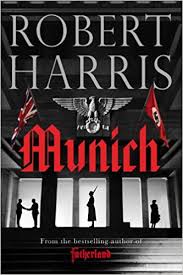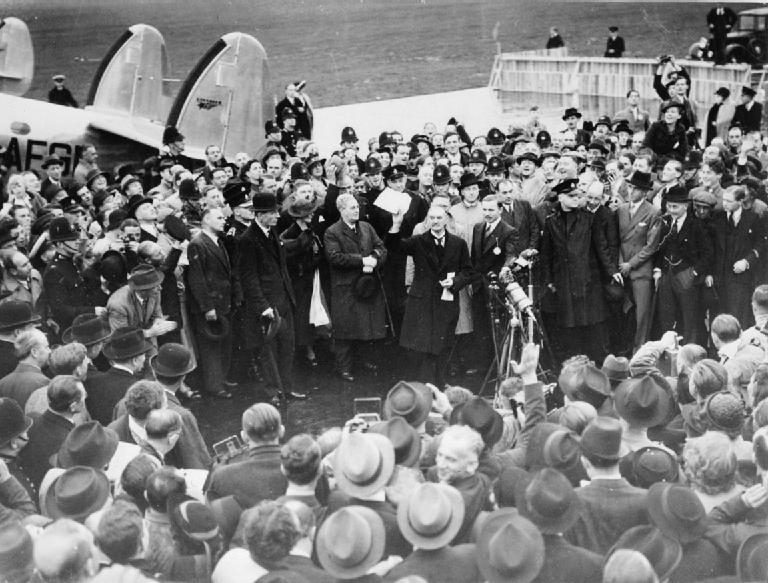A novel about two underlings in the negotiations at Munich in 1938. Years ago I read Georges-Marc Benamou’s ‘The Ghost of Munich’ (2009) concerning the late-life recollections and reflections of
Édouard Daladier, the French Prime Minister who took part along with Neville Chamberlain.

The stereotypes of this episode are many and seldom varied. Too bad. Harris, as always, digs deep into the strata and finds complexity, contradictory strands, variation, mixed motives, and men in way over their heads in deep and dark water where there is no bottom to touch.
In the main the reader looks over the shoulder of the youngest of the private secretaries in Prime Minister Chamberlain’s office, Hugh Legat. At times we see his Oxford friend, Paul Hartman, sometimes it is implied ever so delicately that they were very close and more than friends, who has become a translator in the Wilhemstrasse Foreign Ministry. They meet at Munich.
Much of the novel demonstrates the great pressure Chamberlain was under to find a way to peace and avoid another blood bath, his heart-felt desire to do that, his unflagging energy even at age seventy to pursue every last chance to the Nth degree, and his creative strokes in keeping the peace-process, as we have since learned to call such negotiations, alive on the assumption that talk-talk is better than kill-kill. He emerges as a good swimmer destined to drown in a mighty tsunami.
While the sniping from the Churchill lobby is noted, the real problem is always Hitler. He is the swirling eddy sucking everyone else into the maelstrom. Harris is a master of the detail of the Nazi regime down to the buttons on the uniforms of the waiters, and yet if comes across easily.
Chamberlain’s most creative stroke was to draw Benito Mussolini into the conference and that did buy several days, a week even. Hitler could hardly refuse the participation of his one and only ally, and Mussolini liked a stage and made the most of it with his prolix German and French. But here he is relegated to the wings.
Daladier said virtually nothing, so exhausted and preoccupied was he by the back-stabbing and internecine struggles in Paris that he spent most of the negotiating sessions making plans to do down some of his host of opponents at home. Among his own dwindling supporters some rallied under the banner ‘Better Hitler than Blum,’ the socialist Jewish alternative.
Chamberlain’s second stoke came after the partition of Czechoslovakia was agreed; it was to extract from Hitler that piece of paper he brandished at Heston aerodrome. At the end of the formalities in Munich he asked for a private meeting with Hitler and presented Hitler with a joint statement that paraphrased one of Hitler’s own recent speeches about peace. Clever that. Although Hitler had no interest in seeing Chamberlain he did so, he said, out of courtesy. Still less did he want to issue a joint statement, but he could hardly repudiate his own words just then. Moreover, it was just a piece of paper so why not sign it, if for no other reason than to get Chamberlain to leave. So he did and he did.
Chamberlain is shown to be a terrier about details throughout and to have an encyclopaedic grasp of the situation. He is also aware of how greatly people wanted peace.
Indeed, one of the interesting elements in this telling is the jubilant popularity Chamberlain had in Germany where the women and men in the street saw him as a messenger of peace, and cheered his every appearance. They crowd around the hotel and call for him to appear, but he does not do so in deference to his host. This popularity annoyed Hitler, who darkly grumbles about the problems with Germans weakness.
There is much in the book about how the PM’s office worked, relations with the cabinet, and with the Foreign Office, that shows the stage machinery of such dramas as well as the rivalries. As always Harris has immersed himself completely in the subject. Likewise, we read much about how Hitler’s entourage was organised at the time, as Hartman is drawn into it, and then recoils from it.
Legat and Hartman have their own private dramas but the master narrative that unites them and propels the book is this. What if Chamberlain (and Daladier) knew for a fact that Hitler’s intention was to go to war? Would that knowledge have led to a change at Munich with a different result?
I included Daladier about in parenthesis though there is virtually no liaison with the French shown in these pages. The French were paralysed by their own domestic strife and were present only in body. In Benamou’s novel Daladier is fatalistic. War is coming and there nothing to do but wait, and then he had faith in the Maginot Line. He is more worried about the prospect of a French Civil War similar to that in Spain.
Legat and Hartman offer such proof of the bellicose intention, and Chamberlain refuses it. Intentions can change, he may have believed, and maybe here today we can influence that change. Moreover, there is no advantage in being seen to be the aggressor. He is perfectly aware of the fact that a signature on a peace of paper will not stop Hitler from doing his worst, but it will give England the moral high ground. And it might delay the inevitable if it is inevitable for a few more days.
Furthermore, Hartman’s suggestion that an aggressive Britain would precipitate a coup d’état against Hitler is so much wishful thinking. Everything the Brits saw in Munich convinced them that Hitler had complete control of the country and that fit with every other source of intelligence they had. To be sure there were dissidents but they were but fleas.
Appeasement to use a word that barely figures in this text is the term usually associated with the period immediately before World War II. In its earliest days, when Germany reclaimed the Saar, and the Rhineland, and unilaterally cancelled some debts, appeasement was a positive policy by England, France, and Italy to assuage some of the injustices of the Treaty of Versailles, which had been imposed upon Germany at the insistence of Georges Clemenceau who wanted forever to cripple Germany. Subsequent French governments wanted, not to ease the German plight, but to strike at Clemenceau’s legacy for momentary political advantage, and so acceded to British initiatives to relent. The Brits wanted a German bulwark against Communism from the East.
But the demands from Germany continued, and no one in France or England wanted another war. While England and France had won in 1918, the war nearly destroyed both. Peace was popular, very. In addition internal political turmoil in France was paralytic as its own fascists were inspired by the Italian and German examples and the Spanish Civil War. Italy soon went with the wind into Hitler’s camp. The French hated each other more than any enemy and locked themselves in a battle to the death; that is no exaggeration because there were assassinations and beatings aplenty.
Chamberlain had learned the value of publicity and ensured that the press with BBC news cameras were waiting his return, though Harris is silent on this point, and in the wind after a rain shower he made that much quoted remark with that peace of paper in his hand which promised ‘Peace for our time’ but I have heard it said that this seventy year old after the arduous days in Munich where there was little sleep and no rest misspoke and meant to say ‘Peace for a time.’ By that measure it was a success.

It is certainly plausible but Harris passes on this possibility in silence.
That possibility reminded me of Neil Armstrong’s much quoted 1969 remark ‘one small step for man, one giant leap for mankind.’ Wikiquotes now does Armstrong the service of inserting an indefinite article in from of the noun ‘man’ so that it reads: ‘one small step for [a] man, one giant leap for mankind.’ But accompanying sound file has no ‘a’ in it. The commentariat has been squeezing ego-time out of that ever since.
What else then could Chamberlain do but buy time, and hope against hope that the winds might change, and those cheering crowds in Munich heartened him, though his long political experience meant that he did not bank on an enduring vox populii.
For some years I was an HSC examiner and read each night for three weeks countless, well in fact they were counted — eight an hour — handwritten scripts on Modern History examinations on appeasement and this era. The words occasionally swam before my eyes but on it went but I learned a lot, about both the subject matter and the high school examination process, though as to the latter I was disappointed by its mechanistic rigidity, no paper could be awarded the highest grade of twenty unless it had mentioned every possible point on the list, emphasis on list. Out of the scores I read there was an outstanding one that was intelligent, well written, insightful, and probing but which, because of its tight focus, omitted a single point on the checklist and so, despite my advocacy, it was docked. That still rankles all these years later. (There were many other good ones but I refer to the one I tried to promote. Thereafter I learned my lesson and did not push.)
While indulging in autobiography, I spent a day in Munich in 1983 in a driving rain that inhibited much sight-seeing but I did find the bookstore that figures in a few episodes of ‘Derrick,’ a long running German cop show on SBS.
Skip to content
